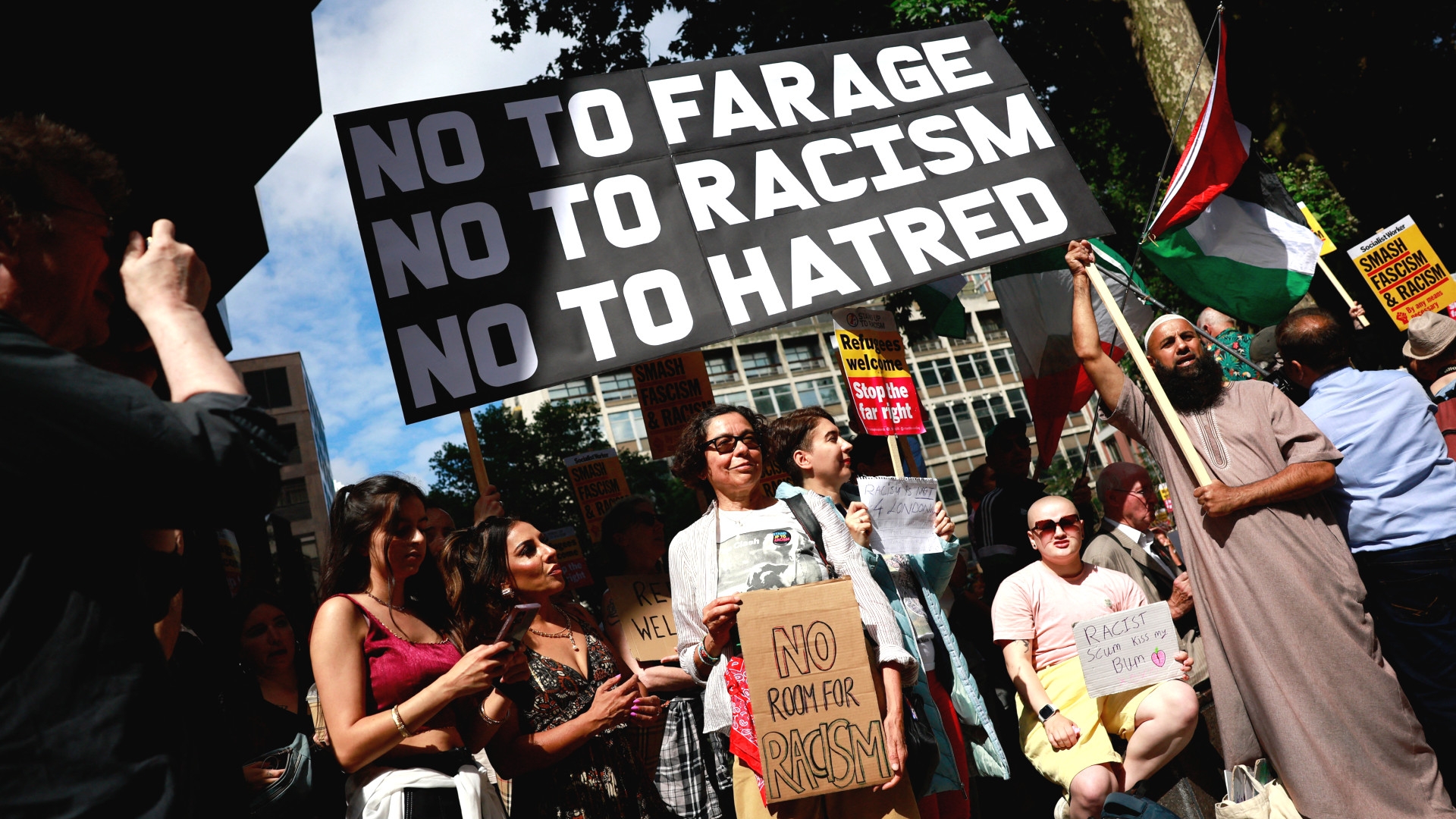UK riots: How the far-right movement became mainstream

The UK riots that began on 30 July following the fatal stabbing of three young girls have reignited the debate over the violent threat the far-right movement poses towards vulnerable communities such as migrants and Muslims.
A wave of misinformation and rumours spread on social media in the wake of the knife attack led to vandalism against British mosques and Muslim graveyards.
The riots also came on the heels of an election campaign in which right-wing media outlets and politicians like Nigel Farage, leader of the Reform Party, scapegoated Muslims and further incited against immigrants.
A poll released last week found that 92 percent of British Muslims feel "much less safe" after the far-right riots. Many expressed fear of leaving their homes, as one in six people reported to have personally experienced a racist attack, and two-thirds stated that they witnessed one against a fellow Muslim.
New MEE newsletter: Jerusalem Dispatch
Sign up to get the latest insights and analysis on Israel-Palestine, alongside Turkey Unpacked and other MEE newsletters
The election campaign in France last month and those previously across Europe, including Italy and Spain, have also seen a wave of far-right politicians winning support among large segments of the electorate.
To understand these recent dynamics, four aspects of the European far-right should be considered: its ideology, objectives, and political agenda; the threat it presents; the impact of such parties at the ballot box; and, most importantly, the reasons people vote for them.
Ideological core
Regardless of their national specificities, right-wing parties and other forces share a common ideological core that has remained consistent throughout time and space, both historically and geographically, and has been translated into very similar electoral proposals.
The ideological core of the "extreme right", more recently renamed "national populism" or "new populism" by political scientists, includes the following: exacerbated nationalism, or the exaltation of national pride, often with a sense of national superiority to others (characteristic of Trumpism, Putinism, and Modism) and a mystique of the nation and "people".
The propagation of alarmist discourse on the 'decline' of western civilisation further drives support for the far-right movement
It upholds a nativist, often racialist (white), and exclusionary understanding of those two sanctified entities.
Other features include the defence of "traditional" or conservative religious values, such as traditional marriage and the nuclear family, in opposition to abortion and same-sex marriage.
The uncompromised, authoritarian enforcement of law and order is another central feature, as is the distrust of "globalism" in its various forms. That includes a rejection of immigration, open borders, cosmopolitanism, and multiculturalism in favour of nationalistic fantasies of a homogenous, immutable society.
The various far-right groups also share similar methods and modes of seduction and appeal. They include populism and the virulent stigmatisation of "arrogant, out-of-touch, and illegitimate" political, cultural, and artistic elites. Anti-establishment posturing - casting oneself as the underdog - or promoting the cult of a strong, charismatic leader - from Donald Trump to Victor Orban and Georgia Meloni - have proven effective tactics alike.
The propagation of alarmist discourse on the "decline" of western civilisation further drives support for the far-right movement.
To explain this supposed "decline", its proponents rely on the systematic scapegoating of "dominant" ideologies such as "globalism" and "wokism", on the one hand, and groups like the "elites" or the "left", on the other (whom they accuse of imposing that nefarious "political correctness"), as well as various minorities.
Mainstream support
As demonstrated recently by the violent British far-right riots, virulent Islamophobia can pose a real and permanent physical threat to Muslims and even to any non-Muslims seen or racialised as Muslims, such as Christian, atheist, or agnostic Arabs.
The well-established historical record of the far right in its various fascist and Nazi incarnations, not to mention its ongoing record of violence, leaves no doubt about the multi-faceted threats, physical and democratic, they present.
While their foremost targets are minorities whom they explicitly designate as enemies within - foreigners, refugees, asylum seekers, Muslims, and dark-skinned individuals - the far right remains a threat to entire societies and nations, as history has amply demonstrated.
No matter how successful their strategies of "detoxification" and normalisation have been, the ideologies they propagate continue to be the worst the West has to offer. Profoundly anti-democratic, inegalitarian, authoritarian, essentialist and exclusivist, they attack universalist western ideals, including the rule of law, separation of powers, and independence of the cultural, media, and intellectual spheres.
More often than not, the far right is rooted in paranoid, hysterical fantasies of racial-civilisational superiority and the threat that supposed white Christian ethnostates face from immigration and "Islamisation".
For those reasons, the spectacular successes of the far right all over the West, including the US, should be of immense concern for at least three reasons: first, over a period of 30 years, the far-right movement has grown so much and so rapidly that what used to be fringe parties, such as France's National Front, are now in a situation where they can and do get elected at the highest levels of government.
Second, their impact should not be measured just by their electoral victories, no matter how considerable, but also by the influence of their ideas and issues of obsession, such as immigration, "Islamisation", the alleged "explosion" of crime and insecurity, across the political spectrum and beyond that, throughout their societies.
In many European countries now, the "theses" of the far right have passed the point of mere banalisation: they have become mainstream.
Third, far from showing any sign of decline, the far right keeps growing in every imaginable way: electorally, sociologically, ideologically, and politically, through the policies being implemented at both the national and EU levels by other political forces that are not right-wing but centrist and even leftist. France is a powerful example that you don't need to have the far right in power to see far-right policies being implemented.
Everywhere, as electoral studies show, the far-right is making headway, getting more and more durably entrenched in the fabric of their societies and the mindset of their populations while attracting more and more demographic segments, including those who so far had remained immune from it.
Whether European or American, the electorate of the far right is not monolithic but diverse, and so are the reasons for voting for Marine Le Pen or Donald Trump.
In the US, Trump recruits among the truly racist, often older parts of the population that have remained nostalgic for their "white Christian America", where minorities of colour were disenfranchised and segregated. But he also fares extremely well among gun fanatics worried about their gun rights if the Democrats were to win, evangelical Christians for whom only the Bible matters, and naive conspiracists who genuinely believe in the most outlandish plot theories.
Other support comes from pragmatic cynics solely interested in their bottom line, such as millionaires and wealthy entrepreneurs who expect bigger tax cuts and fewer environmental regulations with little concern for the rest.
Disenfranchisement
In France, the reasons that so many younger voters between the ages of 18 and 25 supported National Rally leader Jordan Bardella mostly do not intersect with the reasons of other far-right voters.
Studies show that the "TikTok generation" is mainly drawn to his youthful, charismatic, positive, personable, and "cool" image. This substantial and growing portion of the electorate actually cares nothing about politics and issues like immigration, the economy, or Ukraine.
The far right comprise segments of our societies that live poorly and feel that their lifestyles and conservative values are being eliminated
But it does matter that he shares their cultural tastes and is, for example, an avid video gamer who posts on social media about popular games like Call of Duty and Rust, even promising followers to play one-on-one against him if they vote for him.
Those young voters are actually mostly apolitical and, for them, "Jordan" - as he is known to them - is more of an influencer than a politician. In that respect, they have very little in common with the genuinely racist neo-Nazi and radicalised extremists who also vote for the French far right.
Yet the largest parts of the electorates of Trump, Meloni, Le Pen, or Bardella are not found in those groups.
As studies show, their supporters are primarily driven by the sense - often an objective socio-economic reality - of being left behind. They feel threatened by "the system", betrayed by the traditional government parties, especially those on the left, and despised by the cultural and intellectual elites.
'The little people'
Whether French, American, or Polish, the far-right vote is mostly a vote of "the little people".
They comprise segments of society that live poorly and feel that their lifestyles and conservative values are being eliminated due to policies the ruling class has enacted over the last several decades, including the construction of the European Union, the shift to neoliberal economics, and globalisation, among others.
These are the small-town voters who experienced the degradation of their cities and villages, the closure of businesses like local cafes and grocery stores, and the loss of public services like hospitals, banks, and post offices.
Moreover, they are the people who live in remote rural areas, rely on their cars more than city dwellers, and have been hit hard by the increase in energy prices, especially gasoline - a major concern among Bardella supporters.
They further include the struggling European farmers who suffered from imposed European quotas and environmental regulations that limited their production and crushed them economically. And they include the blue-collar working classes who lost their industries and jobs to de-industrialisation, outsourcing, and delocalisation, the small employees surviving on low-paid jobs and more.
Those popular classes who experienced or are haunted by the fear of downgrading, or class demotion and regression, as opposed to the socio-economic growth promised to them by their governments) are the core voters of those parties.
Far-right parties first capitalised on such widespread socio-economic hardship, then skilfully transformed that suffering into "culture wars". The answer to their problems would be "solved" through cultural (and imaginary) solutions such as an end to immigration, a return to traditional family values, and fighting Islam.
Back in the 1980s, the founder of France's National Front, Jean-Marie Le Pen, had already understood this perfectly when he coined his strikingly effective campaign slogan: "One Million Unemployed Frenchmen = One Million Immigrants", in a perfect articulation and superimposition of the two sets of fears that fuel the far-right vote everywhere: the economic ones and the cultural or identitarian ones.
The main reason for the successes of those parties has thus been their ability to aggregate the sum of all the suffering, fears, insecurities and anxieties of those vulnerable, struggling, humiliated, and largely abandoned popular classes for whom the American or European Dream has already largely vanished.
Through classic scapegoating, they have exacerbated the pain, difficulties, sorrow and sense of loss of their lived experience and channelled it into anger at entities like the European Union and groups they blamed for their problems, such as immigrants, foreigners, "globalist" governments, and the "arrogant cultural elites". They offered hope through simplistic and fallacious solutions like becoming "tough on crime" or ending immigration.
The far-right movement will continue to grow until other political forces grapple with the mounting socio-economic hardship that for decades has pushed vast segments of the population into the arms of those parties and their false solutions.
The views expressed in this article belong to the author and do not necessarily reflect the editorial policy of Middle East Eye.
Middle East Eye delivers independent and unrivalled coverage and analysis of the Middle East, North Africa and beyond. To learn more about republishing this content and the associated fees, please fill out this form. More about MEE can be found here.







